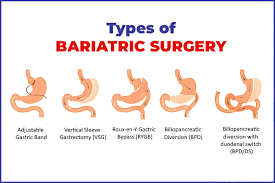
Transforming Lives: The Power of Weight Loss Surgeries in Achieving Lasting Results
Weight Loss Surgeries: A Path to a Healthier You
In today’s world, where obesity rates are on the rise, weight loss surgeries have emerged as an effective solution for individuals struggling with severe weight-related health issues. These surgical procedures offer hope and a new beginning for those seeking to improve their overall well-being.
The Need for Weight Loss Surgeries
Obesity is a complex medical condition that can lead to various health complications such as diabetes, heart disease, and joint problems. For some individuals, traditional methods of weight loss like dieting and exercise may not provide the desired results. In such cases, weight loss surgeries can be life-changing.
The Different Types of Weight Loss Surgeries
There are several types of weight loss surgeries available today, each with its own benefits and considerations:
- Gastric Bypass Surgery: This procedure involves creating a small pouch in the stomach and rerouting the digestive tract. It reduces both the amount of food you can eat and the absorption of nutrients.
- Gastric Sleeve Surgery: This surgery involves removing a portion of the stomach to create a smaller sleeve-shaped stomach. It reduces hunger and limits food intake.
- Gastric Banding Surgery: In this procedure, an adjustable band is placed around the upper part of the stomach, creating a smaller pouch. The band can be tightened or loosened as needed.
The Benefits and Considerations
Weight loss surgeries offer numerous benefits beyond just shedding pounds:
- Significant Weight Loss: Patients can achieve substantial weight loss, leading to improved overall health and reduced risk of obesity-related diseases.
- Improved Quality of Life: Weight loss surgeries can enhance self-esteem, body image, and mobility, allowing individuals to engage in activities they may have previously avoided.
- Resolution of Obesity-Related Health Issues: Many obesity-related conditions such as diabetes, high blood pressure, and sleep apnea can be alleviated or even resolved after weight loss surgery.
However, it is important to note that weight loss surgeries are not a quick fix or an easy way out. They require commitment and lifestyle changes to ensure long-term success. Patients must adopt healthy eating habits, regular exercise routines, and follow-up with their healthcare providers for monitoring and support.
Is Weight Loss Surgery Right for You?
If you have struggled with obesity and traditional weight loss methods haven’t provided the desired results or if you have weight-related health issues that require urgent attention, weight loss surgery may be a viable option for you. However, it is crucial to consult with a qualified healthcare professional who specializes in bariatric surgery to determine the most suitable approach based on your unique circumstances.
Your Journey Towards a Healthier Future
Weight loss surgeries offer hope for individuals seeking long-term weight management solutions. They provide an opportunity to regain control over one’s health and enjoy a higher quality of life. If you are considering weight loss surgery as a pathway towards a healthier future, take the first step by consulting with a trusted healthcare provider who can guide you through this transformative journey.
Understanding Weight Loss Surgeries: Types, Candidacy, Risks, Outcomes, Lifestyle Changes, and Insurance Coverage
- What are the different types of weight loss surgeries?
- Who is a suitable candidate for weight loss surgery?
- What are the risks and complications associated with weight loss surgeries?
- How much weight can I expect to lose after undergoing weight loss surgery?
- Will I need to make lifestyle changes after the surgery?
- Is weight loss surgery covered by insurance?
What are the different types of weight loss surgeries?
There are several different types of weight loss surgeries available to individuals seeking effective solutions for severe obesity. These surgeries include gastric bypass surgery, gastric sleeve surgery, and gastric banding surgery. Gastric bypass surgery involves creating a small pouch in the stomach and rerouting the digestive tract to reduce food intake and nutrient absorption. Gastric sleeve surgery involves removing a portion of the stomach to create a smaller sleeve-shaped stomach, reducing hunger and limiting food intake. Gastric banding surgery involves placing an adjustable band around the upper part of the stomach to create a smaller pouch, allowing for tightening or loosening as needed. Each type of weight loss surgery has its own benefits and considerations, and it is important to consult with a healthcare professional specializing in bariatric surgery to determine the most suitable option based on individual circumstances.
Who is a suitable candidate for weight loss surgery?
Weight loss surgery is a significant decision that requires careful consideration. While each case is unique, suitable candidates for weight loss surgery typically include individuals who have a body mass index (BMI) of 40 or higher, or those with a BMI of 35 or higher with obesity-related health conditions. Additionally, candidates should have made sincere attempts to lose weight through diet and exercise without achieving significant and sustainable results. It is important for potential candidates to undergo a thorough evaluation by a qualified healthcare professional specializing in bariatric surgery to determine their eligibility and ensure they are mentally and physically prepared for the procedure.
What are the risks and complications associated with weight loss surgeries?
Weight loss surgeries, like any surgical procedure, carry certain risks and potential complications. It is important for individuals considering these surgeries to be aware of these factors. Some common risks include infection, bleeding, blood clots, and adverse reactions to anesthesia. Complications can include leaks or blockages in the digestive system, gallstones, nutritional deficiencies, and changes in bowel habits. Additionally, weight loss surgeries may require lifelong follow-up care and monitoring to address any potential issues that may arise. It is crucial for patients to thoroughly discuss these risks with their healthcare provider and make an informed decision based on their individual health profile.
How much weight can I expect to lose after undergoing weight loss surgery?
The amount of weight an individual can expect to lose after undergoing weight loss surgery varies depending on several factors, including the type of surgery performed, the individual’s starting weight, and their commitment to making lifestyle changes. On average, patients can anticipate losing a significant amount of weight within the first year following surgery. Gastric bypass and gastric sleeve surgeries typically result in greater weight loss compared to gastric banding. While results may vary, it is not uncommon for patients to achieve a weight loss of 50% or more of their excess body weight. It’s important to remember that weight loss surgery is not a magic solution but rather a tool that, when combined with proper diet, exercise, and ongoing support, can lead to long-term success in achieving and maintaining a healthier weight.
Will I need to make lifestyle changes after the surgery?
Yes, lifestyle changes are an integral part of the weight loss surgery journey. While weight loss surgeries can jumpstart your weight loss and improve your overall health, they are not a standalone solution. After the surgery, you will need to make significant adjustments to your lifestyle, including adopting healthy eating habits and incorporating regular exercise into your routine. These changes are crucial for long-term success and to maintain the weight loss achieved through the surgery. Additionally, ongoing follow-up with healthcare professionals is important to monitor your progress, provide guidance, and offer support throughout your transformational journey. Embracing these lifestyle changes will not only enhance the effectiveness of the surgery but also contribute to a healthier and more fulfilling life in the long run.
Is weight loss surgery covered by insurance?
One frequently asked question regarding weight loss surgeries is whether they are covered by insurance. The answer to this question may vary depending on the individual’s insurance policy and the specific circumstances surrounding the surgery. In some cases, insurance companies do provide coverage for weight loss surgeries, especially if they are deemed medically necessary due to obesity-related health issues. However, it is important for individuals to thoroughly review their insurance policies and consult with their healthcare providers to determine the extent of coverage and any potential out-of-pocket expenses.


